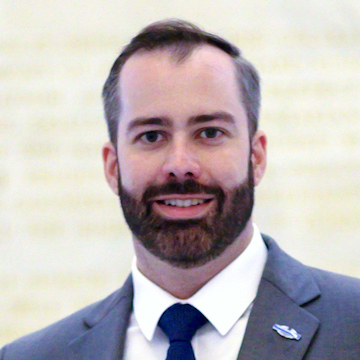IAVA | April 13, 2023
READ: Congress Struggles to “See the Forest for the Weeds”

Submitted by: Rodger Pinto, US Army Veteran
I grew up in suburban Indiana, and like many young people in our country, I was exposed to cannabis at an early age. Cannabis is ubiquitous in American culture, and despite billboards shouting, “Just Say No,” I experimented with cannabis in high school, preferring it to alcohol.
Preference aside, being a cannabis user was never a life goal for me, and it became clear to me that our nation couldn’t “see the forest for the weeds,” as negative connotations associated with cannabis and racial undertones that led to its classification as a Schedule I controlled substance continued to limit our understanding of its potential. I graduated and left cannabis behind, heading off to basic training to begin my career as an Army Infantry Paratrooper.
Early in my career, I suffered a back injury requiring surgery and convalescence leave. Waiting at the airport to pick me up was my father. Having worked in the medical industry, he was particularly concerned about the medication I was prescribed and warned me about the risks associated with opioid use. This conversation was a turning point for me as it brought the subject of cannabis out of the indiscretions of my youth and into my thoughts as a responsible member of society. I couldn’t ignore the contrast between my father’s understanding of the risks of opioid use and the federal classification of cannabis.
Despite my injury, I recovered, deploying to Iraq and Afghanistan, becoming an NCO, and later Battalion Prevention Leader for the Army Substance Abuse Program. In this role, I developed a deep appreciation for the negative consequences of a culture that glorifies alcohol and mourned the careers and lives of soldiers gripped by opioid addiction. Unfortunately, I suffered a knee injury and, despite not having been seen by an orthopedic specialist or an MD, was diagnosed with a chronic condition. I subsequently transitioned out of the military and sought a second opinion. In the process, I rediscovered an alternative to traditional treatments: cannabis.
As a veteran, I have experienced firsthand the challenges and limitations of military and veteran-related healthcare. To meet the needs of its patients, DOD/VA healthcare collectively relies on skilled Physician Assistants (PA) as primary providers. In turn, they rely on the expertise of a limited number of specialized providers in the continued care of their patients. Unfortunately, patient demand exceeds the capacity of specialized providers, often necessitating the prolonged use of pharmaceuticals through diagnostic treatment.
While recent strides have been made in reforming prescription policy, particularly in response to the opioid epidemic, reliance on the prolonged use of potentially harmful pharmaceuticals in lieu of timely specialized treatment creates significant deficits in the quality of care received by servicemembers and veterans. These deficits are detrimental to healthcare modernization and have contributed to a wide spectrum of issues in the military and veterans’ community, including the oversized impact of the opioid epidemic.
Congressional support is essential in DOD/VA healthcare’s efforts to modernize. This includes the use of cannabis and other alternative treatments, which decrease the prolonged use of pharmaceuticals. Overwhelmingly, the military and veterans’ communities have demonstrated a preference for cannabis, alongside 37 states and 4 U.S. territories that have implemented medical cannabis programs and 21 states that have legalized recreational cannabis use. Yet, despite more than two-thirds of Americans favoring the legalization of cannabis, Congress continues to struggle to “see the forest for the weeds.”
Legislation before the 118th Congress provides a promising path to federal medicinal authorization, opening the door to a substantive and informed policy discussion at the federal level that accurately represents the desire of our nation to logically approach cannabis policy. Led by grassroots advocacy and legislative entrepreneurship at the state level, the movement to normalize cannabis in our economic, social, and political discourse is well underway, and it’s past time that Congress reflected the will of the people.
Federally, congressional resistance to cannabis-related policy has evolved largely from moral and ethical constraints to knowledge-centered objections that focus on a lack of hard data. HR 1003 and SB 326, introduced in the House and Senate, respectively, as the VA Medicinal Cannabis Research Act of 2023, overcome federal policy obstacles that, by design, undercut data-driven research and medical advancement.
The VA Medicinal Cannabis Research Act of 2023 directs the Department of Health and Human Services (HHS) and the Department of Veterans Affairs (VA) to establish programs funding research into the therapeutic effects of cannabis and its derivatives and tasks the Secretary of HHS to create a scientific advisory board to review grant applications related to cannabis research. Included are protections for researchers and patients involved in cannabis research and patient privacy guidelines that allow the use of anonymized data in cannabis research.
Additionally, the VA Medicinal Cannabis Research Act of 2023 authorizes HHS to award grants to universities, medical centers, and other research institutions to conduct clinical research into the potential therapeutic effects of cannabis and requires HHS to develop standards for the collection, storage, and reporting of research data while ensuring all data collected in the course of research is made publicly available.
The 118th Congress has the opportunity to address federal cannabis policy in a comprehensive and informed manner. The constraints of antiquated, racist, ill-informed policy decisions of the past have largely been dismantled. The movement to normalize cannabis has succeeded, and the VA Medicinal Cannabis Research Act of 2023 addresses the remaining knowledge-centered objections of policymakers through the prioritization of data-driven scientific research that reflects the will of the people and leads to sensible federal cannabis policy.
As a society, it is our responsibility to continue to educate ourselves, challenge stigmas, and approach cannabis with a nuanced and evidence-based perspective that, at a minimum, ensures those who can benefit from its medicinal properties have access to safe and effective treatments. I urge our Congressional leaders to “see the forest for the weeds,” adopt comprehensive and informed approaches to federal cannabis policy, and pass the VA Medicinal Cannabis Research Act of 2023. The rest of the nation already has, and we’re tired of waiting.





